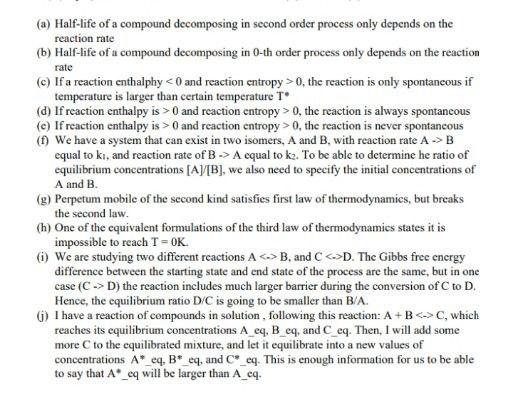Answered step by step
Verified Expert Solution
Question
1 Approved Answer
mark each of True or False. (a) Half-life of a compound decomposing in second order process only depends on the reaction rate (b) Half-life of
mark each of True or False.
(a) Half-life of a compound decomposing in second order process only depends on the reaction rate (b) Half-life of a compound decomposing in 0-th order process only depends on the reaction rate (c) If a reaction enthalphy 0, the reaction is only spontaneous if temperature is larger than certain temperature T (d) If reaction enthalpy is> 0 and reaction entropy > 0, the reaction is always spontaneous (e) If reaction enthalpy is> 0 and reaction entropy > 0, the reaction is never spontaneous (f) We have a system that can exist in two isomers, A and B, with reaction rate A >>> B equal to ki, and reaction rate of B-> A equal to k. To be able to determine he ratio of equilibrium concentrations [A]/[B], we also need to specify the initial concentrations of A and B. (g) Perpetum mobile of the second kind satisfies first law of thermodynamics, but breaks the second law. (h) One of the equivalent formulations of the third law of thermodynamics states it is impossible to reach T=OK. (i) We are studying two different reactions A >> D) the reaction includes much larger barrier during the conversion of C to D. Hence, the equilibrium ratio D/C is going to be smaller than B/A. (j) I have a reaction of compounds in solution, following this reaction: A + B C, which reaches its equilibrium concentrations A eq, B_eq, and C eq. Then, I will add some more C to the equilibrated mixture, and let it equilibrate into a new values of concentrations A*_eq, B*_eq, and C*_eq. This is enough information for us to be able to say that A*_eq will be larger than A_eq.
Step by Step Solution
★★★★★
3.48 Rating (158 Votes )
There are 3 Steps involved in it
Step: 1
a Halflife of a compound ...
Get Instant Access to Expert-Tailored Solutions
See step-by-step solutions with expert insights and AI powered tools for academic success
Step: 2

Step: 3

Ace Your Homework with AI
Get the answers you need in no time with our AI-driven, step-by-step assistance
Get Started


